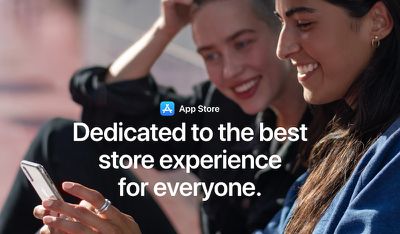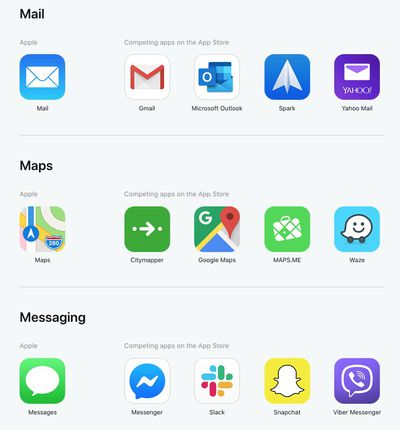Apple has faced increasing scrutiny as of late over the way it runs its App Store, ranging from Spotify's anticompetitive complaint in Europe to a class action lawsuit accusing Apple of operating an App Store monopoly in the United States, which the Supreme Court recently allowed to proceed.

Apple has now responded with a new page on the App Store section of its website titled Principles and Practices, noting that the App Store was created with two goals: to be "a safe and trusted place for customers to discover and download apps" and "a great business opportunity for all developers."
To achieve the first goal, Apple says it "takes responsibility" for "ensuring that apps are held to a high standard for privacy, security, and content" in accordance with its publicly accessible App Store Review Guidelines:
We believe that what's in our store says a lot about who we are. We strongly support all points of view being represented on the App Store. But we also take steps to make sure apps are respectful to users with differing opinions, and reject apps for any content or behavior that we believe is over the line — especially when it puts children at risk. For example, we strictly prohibit any app that features pornographic material, discriminatory references, torture and abuse, or anything else in exceptionally poor taste.
Apple says an average of 100,000 apps are reviewed per week, most within 24 hours, by a combination of "hundreds of human experts" and "automated systems." Apple says 60 percent of submissions are approved, with 40 percent rejected, mostly commonly due to minor bugs followed by privacy concerns.
All developers have the opportunity to have a rejection reviewed, with Apple making some 1,000 calls a week to developers to help them resolve any issues.
As for the second goal, Apple says the App Store "welcomes competition":
We believe competition makes everything better and results in the best apps for our customers.
We also care about quality over quantity, and trust over transactions. That’s why, even though other stores have more users and more app downloads, the App Store earns more money for developers. Our users trust Apple — and that trust is critical to how we operate a fair, competitive store for developer app distribution.
Apple includes many examples of third-party apps that compete with its own apps, such as Spotify versus Apple Music and Google Maps versus Apple Maps.

Apple notes that it supports developers by providing a robust set of tools and SDKs, free marketing opportunities such as the opportunity to be featured in the Today tab on the App Store, programs such as the Apple Developer Academy, and free educational materials such as Everyone Can Code.
84 percent of apps are free, according to Apple, although many are supported by ads, in-app purchases, or subscriptions. Apple collects a 30 percent commission on in-app purchases tied to digital goods, and takes a 30 percent cut of subscriptions for the first year and a 15 percent cut in subsequent years.
Apple's former App Store review team leader raises concerns
In a new podcast interview with Bloomberg's Mark Gurman, Apple's former senior director of the App Store review team Phillip Shoemaker raised concerns about potential conflict between Apple and its competitors on the App Store.
"There is now a conflict as Apple goes into these spaces that are ripe with competition," he said. "I'm really worried about the competition."























